Blog
Archive for the ‘Philanthropy’ Category
Canary’s International Collaboration – ACED
March 8, 2021
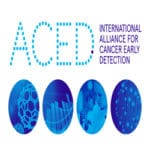
The International Alliance for Cancer Early Detection (ACED) joins researchers from the United States and the United Kingdom in a $70 million partnership. Founded in 2019, ACED is a partnership with the Canary Center at Stanford University, CRUK, the University of Cambridge, the Knight Cancer Institute at Oregon Health and Science University (OHSU), University College London and the University of Manchester. The following is one study chosen for it’s innovative approach to early detection:
Stratifying Risk for Early Detection in Hereditary Breast and Ovarian cancer
Project Award, led by: Marc Tischkowitz, University of Cambridge; Allison Kurian, Canary Center at Stanford for Cancer Early Detection; and Gareth Evans, University of Manchester. Stanford Team: Allison Kurian, Alice Fan, James Ford
CanRisk is a cancer risk assessment tool which combines genetic, lifestyle, clinical and imaging data to calculate an individual risk estimate for women with high-risk mutations in BRCA1 and BRCA2. The ability to provide personalized cancer risk estimates will identify women at particularly high risk. Currently, the ranges of cancer risk estimates for women with hereditary mutations in breast cancer genes are wide and not personalized, so all women are given the same figures. Creating a customized approach can solve this problem.
By implementing personalized risk estimates, early detection strategies can be tailored for the individual, therefore identifying those at the highest risk. Once feasibility is assessed, women undergoing predictive testing for BRCA1, BRCA2, PALB2, ATM or CHEK2 in US and UK genetics centers will be randomized to conventional vs personalized risk estimate based on genetic/lifestyle/hormonal modifiers.
Canary Foundation Welcomes Dr. Joseph DeSimone
November 22, 2020
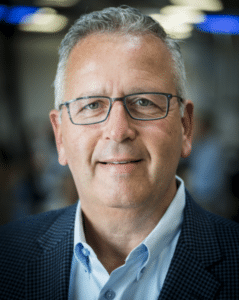
Dr. Joseph DeSimone
We welcome Professor Joseph M. DeSimone, PhD. in the position of the Sanjiv Sam Gambhir Professor in Translational Medicine. We are fortunate to have such creative and capable leadership as our work together in cancer early detection continues.
From the Stanford Press Release: The Stanford Department of Radiology is proud to announce Professor Joseph M. DeSimone as the inaugural Sanjiv Sam Gambhir Professor in Translational Medicine. A shining example of achievement, Joe has been described as “an igniter of innovation”. He has received international recognition as a scientist, inventor, and entrepreneur, earning major accolades including the U.S. Presidential Green Chemistry Challenge Award, the 2017 Heinz Award, and the Lemelson-MIT Prize. He is one of only 25 individuals elected to all three U.S. National Academies—the National Academy of Sciences, Medicine, and Engineering. In 2016, President Obama presented him with the National Medal of Technology and Innovation, the highest honor in the U.S. for achievement and leadership in advancing technological progress. Read more here.
Joe and his lab have made significant scientific breakthroughs in science and medicine including next-generation approaches to cancer treatment and diagnosis, implantable drug delivery devices, green chemistry, and most recently in 3D printing technology for medical devices tailored to an individual patient’s needs. A dedicated educator and strong advocate for bringing a broader diversity of perspectives into research, he has mentored over 80 students through PhD completion at Univ. of North Carolina and North Carolina State Univ. (his former 30-year career), half of whom were women and members of underrepresented groups in STEM.
As an avid researcher and innovator, Joe has authored over 370 scientific publications with over 42,000 citations to his work, and is a named inventor on over 200 issued patents. Additionally, he brings a unique ability to transfer novel solutions from his lab to the world through the companies he co-founded.
The Early Detection of Cancer Conference at Stanford!
October 9, 2019
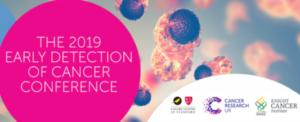 Canary Center at Stanford, Cancer Research UK, and the OHSU Knight Cancer Institute, hosted the Early Detection of Cancer Conference September 24 – 26 at the Frances C. Arrillaga Alumni Center, Stanford, California. Approximately 370 attendees, from 120 institutions, and 11 countries outside of the USA (including Australia, Canada, China, Finland, France, Great Britain, India, Netherlands, South Korea, Switzerland, and Ukraine) brought forth their latest findings and ideas. The annual Conference brings together experts in early detection from multiple disciplines to share ground breaking research and progress in the field.
Canary Center at Stanford, Cancer Research UK, and the OHSU Knight Cancer Institute, hosted the Early Detection of Cancer Conference September 24 – 26 at the Frances C. Arrillaga Alumni Center, Stanford, California. Approximately 370 attendees, from 120 institutions, and 11 countries outside of the USA (including Australia, Canada, China, Finland, France, Great Britain, India, Netherlands, South Korea, Switzerland, and Ukraine) brought forth their latest findings and ideas. The annual Conference brings together experts in early detection from multiple disciplines to share ground breaking research and progress in the field.
The conference is part of a long-term commitment to invest in early detection research, to understand the biology behind early stage cancers, find new detection and screening methods, and enhance uptake and accuracy of screening.
The talks ventured widely, from finding ways to extract more information from cell-free DNA in blood, to building cohorts of people at high risk of cancer to prospectively study the emergence of disease, to the role of the tumor micro-environment and the immune system in cancer early detection, and going beyond traditional risk factors to better select populations for targeted cancer screening.
Highlights of this year’s conference included: More »
Project Baseline aims to map human health
February 3, 2019
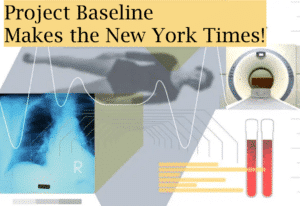 What if we could view changes in the body earlier than early to warn of possible disease? That is the aim of Project Baseline, to map human health. The New York Times published “Project Baseline Aims to Ward Off Illness Before We Get Sick” by Anahad O’Connor (Oct 2018). The study is recruiting 10,000 adults. And each will be examined and followed for at least four years. So the goal is to discover the earliest warning signs of cancer, heart disease and other killers. Participants, the first of whom was enrolled in 2017, are called Baseline Explorers.
What if we could view changes in the body earlier than early to warn of possible disease? That is the aim of Project Baseline, to map human health. The New York Times published “Project Baseline Aims to Ward Off Illness Before We Get Sick” by Anahad O’Connor (Oct 2018). The study is recruiting 10,000 adults. And each will be examined and followed for at least four years. So the goal is to discover the earliest warning signs of cancer, heart disease and other killers. Participants, the first of whom was enrolled in 2017, are called Baseline Explorers.
Project Baseline is the result of conversations in 2013, led by Google X’s Andrew Conrad. He consulted with Dr. Sam Gambhir, MD, chair of Radiology at Stanford University and director of the Canary Center for Cancer Early Detection. And also with Robert M. Califf, MD, professor of Cardiology in the School of Medicine, Duke University.
Conrad (now CEO of Verily, a spin out of Google X) was interested in exploring with these two notable healthcare thought leaders, one in cancer and the other in cardiology, about how to create what has become a landmark study. Both had deep experience in working with large patient cohorts and focus on early detection of disease. The project has formed teams across the country.
Seeking to create a baseline of health
Traditional trials focus on those who have a disease. So Project Baseline, as the name implies, mainly enrolls healthy individuals gathering enormous amounts of information. Baseline equips enrollees with wearable technology from Verily that tracks sleep patterns, heart rhythms and physical activity. The team is developing tools and technologies to collect, organize, analyze and curate the data.
And investigators are determining the best ways to share data with participants that is helpful to them. They are looking at how they can engage with their medical professionals.
Canary Foundation and the Canary Center at Stanford for Cancer Early Detection
Dr. Gambhir has served as Canary Foundation’s scientific director for more than a decade. He led the development of the Canary Center at Stanford for Cancer Early Detection. The Canary Center is a partnership forged in 2008 between Stanford University and Canary Foundation under the leadership of Don Listwin, based on the foundation’s mission. And interesting to know, Canary Center is the first program Stanford has focused entirely on cancer early detection.
Longtime Canary Supporters Will Match Your Gift for Silicon Valley Gives May 3
April 28, 2016
Evan and Cindy Goldberg of Woodside, CA will match your gift to fund early cancer detection research up to $100,000 for Silicon Valley Gives on May 3. If you make a donation to Canary Foundation during this 24-hour online fundraising event, it will be matched by the Goldbergs’ generous donation.
To contribute, visit Canary Foundation’s Silicon Valley Gives fundraising page anytime on Tuesday, May 3.
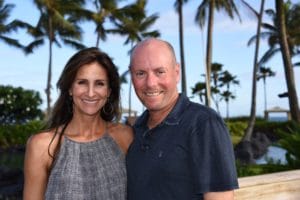
Evan and Cindy Goldberg
Why the Goldbergs support early detection research
There’s no debate that early cancer detection saves lives. No one knows this better than the Goldbergs.
The couple has several family members who have had cancer, but thanks in large part to early diagnosis, all of them survived.
“They were helped by early detection, and it was a major factor in being cured. Even earlier detection may have made their treatments less invasive,” Cindy says.
Longtime supporters of Canary Foundation, the Goldbergs believe that finding cancer earlier, with more accurate testing methods, is the first line of defense, and that reliable earlier detection will make new cancer therapies more effective.
“We are inspired by the incredible commitment of Don Listwin, Canary’s founder, and Dr. Sanjiv Gambhir, chair of Radiology at Stanford University and director of the Canary Center at Stanford,” shares Evan. “Their ideas are life-saving, cost-effective and long overdue.”
Join Evan and Cindy in helping Canary Foundation find cancer early. It’s about time.
Upwards and Onwards: Canary Goals for 2014
January 29, 2014
The beginning of the year presents a cue to reflect on the successes of the previous year, and look forward to goals for the coming months. We’re delighted to announce progress with our research that has tremendous implications for future innovations, as well as our ambitions for the Canary Challenge 2014.

New technologies always evoke excitement and anticipation. Here at Canary, if a scientist wants to use a new technology to advance or improve the ways we detect cancer tumors early, we are all for it. Enhanced ultrasound using microbubble technology is one of these technologies.
This technology will change the way doctors view tumors. Microbubbles are miniature gas bubbles, mostly containing oxygen or air, which can be uniformly suspended in a liquid such as blood. Due to their size, they can pass through even the smallest of blood vessels and therefore are commonly used together with medical ultrasound imaging. As effective vehicles for highlighting blood in ultrasound images, Canary scientists use microbubbles as a contrast agent to view cancer tumors. Our clinical trials in Rome with women who have ovarian cancer have produced great results. Here in the US, we anticipate replicating microbubble technology for applications with breast cancer, prostate and pancreatic cancer.
We also value and actively seek out key partnerships, whether academic or industry. Soon we’ll announce a partnership with Genomic Health Inc. in the area of prostate cancer. We’re in talks with MD Anderson in Houston to help with coordinating a national multi-institutional lung cancer study.
We have great plans for our largest fundraising event, the Canary Challenge, which is about to get bigger and better than ever. Mark your calendar now for September 27, 2014. Register now for $25 until March 31. The event will be hosted at HP’s campus in Palo Alto on Hanover St. We’re aiming high this year with a goal of raising $1.5 million, recruiting 150 teams and over 1,500 riders. This year’s ride will benefit the Canary Center at Stanford, supporting the researchers, scientists and doctors who are dedicated to cancer early detection. Come be a part of an amazing one-day cycling event!
We’re pleased to announce that we will again be partnering with women’s pro cycling team extraordinaire, the Vanderkittens, who will host monthly training rides for Canary Challenge riders. Hani Juha, a cyclist and great coach, of Menlo Bike Club will also offer weekly training rides, an annual training program, as well as monthly clinics. We invite anyone and everyone in the Canary community to take advantage of these tailored experiences to brush up on their skills in time for the event.
What are your hopes and dreams for cancer early detection research at Canary Foundation? Let us know in the comments below!
What’s it Like to Ride the Canary Challenge?
December 16, 2013
Save the date to register for the Canary Challenge 2014- registration opens on January 4 in the New Year!
Canary Awards for Outstanding Early Cancer Detection Research
October 29, 2013
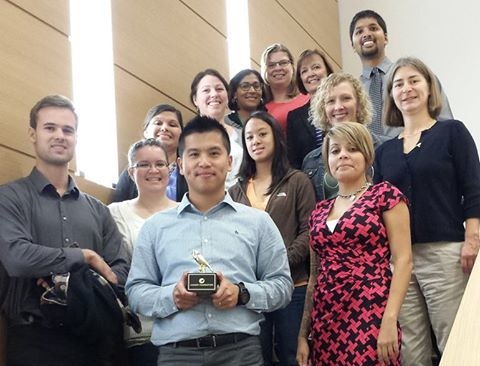
Photo: The clinical trial coordinators for the Canary Prostate Active Surveillance Study (PASS) accept the 2013 Canary Award on behalf of the Canary Prostate Team.
Dr. Dianne Miller was presented with the award for her team’s success in promoting adoption of ovarian cancer prevention programs throughout the Canadian province of British Columbia. Because lethal ovarian cancer often originates in fallopian tubes, their removal can prevent the development of ovarian cancer, potentially reducing the incidence by 50% or more. Since the advent of the British Columbia educational campaign in September 2010, clinics across the province have seen a practice shift toward removal of fallopian tubes during common gynecological surgeries (such as hysterectomy and tubal ligation), thanks to the efforts of Dr. Miller’s team.
The Canary Prostate team was presented with the Canary Award for the team’s success in meeting or exceeding all of its major milestones in the Prostate Active Surveillance Study (PASS) clinical trial. Earlier in the month of October, 2013, the PASS trial celebrated reaching another major milestone, as the 1,000th participant was enrolled in the trial. The trial’s goal is to manage low-risk prostate cancer through active surveillance while identifying markers to distinguish non-aggressive prostate cancer from potentially lethal disease.
Congratulations to both teams for all their hard work, and to all the Canary teams who work tirelessly to develop research and solutions to make accessible cancer early detection a reality.
Breast Cancer Early Detection Research at Canary Foundation
October 7, 2013
In the United States, it is estimated that there will be 232,340 new breast cancer cases and 39,620 breast cancer mortalities in 2013. 1 in 8 women will be diagnosed with breast cancer during their lifetime. Despite the widespread use of mammography, the technology is limited as many cancers are missed and conversely many women undergo biopsies and surgeries of benign or non-aggressive tumors.

Canary Foundation is supporting a Breast Cancer Early Detection Initiative focused on finding blood-based and imaging biomarkers to improve the current state of breast cancer early detection. The vision of the blood work is to distinguish women with benign versus malignant tumors, and to identify the aggressive, hard to detect, breast cancers. The vision of the imaging work is to detect breast cancer at the earliest stages, when the tumors are very small.
Canary is committed to funding safe, efficient, cost effective tests for cancer early detection.
Riding to Victory! Cancer Early Detection Fundraising at the Canary Challenge 2013
October 3, 2013
This past weekend, 800 cyclists converged at VMware village to kick off Canary Challenge 2013, a great increase over the number of riders from last year! Over $800,000 was raised to benefit cancer research at the Stanford Cancer Institute and Canary Center for Cancer Early Detection at Stanford.

There were a total of 78 teams participating, with over 120 volunteers cheering, manning registration, and passing out drinks and snacks to replenish riders along the route. Most incredible was the great energy at the event – participants’ dedication and commitment to the cause was palpable, and the celebratory air when cyclists returned triumphant from their rides was electric.
 We loved when riders stopped by the social photo booth to show us “#WhyIRideCanary”. Everyone who contributed to the event did so because they were inspired by the need for cancer early detection research. It was incredible to hear their stories – a great reminder of why we ride.
We loved when riders stopped by the social photo booth to show us “#WhyIRideCanary”. Everyone who contributed to the event did so because they were inspired by the need for cancer early detection research. It was incredible to hear their stories – a great reminder of why we ride.
A great thank you to all the riders, sponsors, volunteers and staff who came together on September 28 to make this ride such a great success. Ride on, Canary Challenge participants! Save the date for next year: September 27, 2014!
